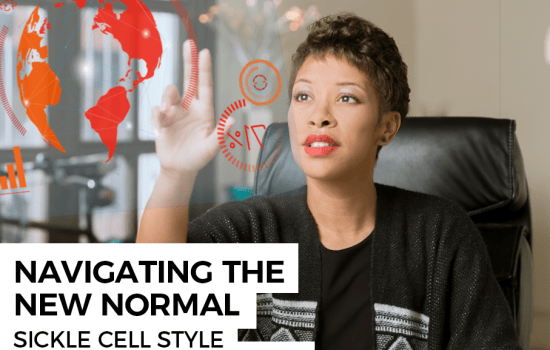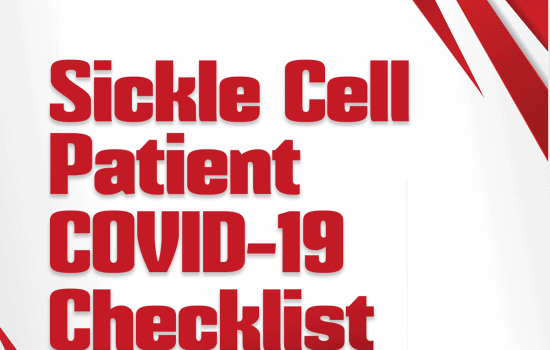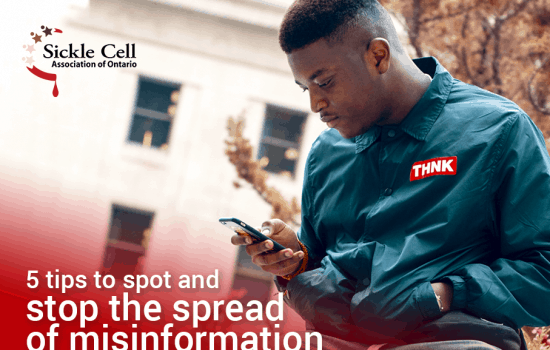Navigating the New Norm: Sickle Cell Style
During the last couple of months, the world has changed as we know it. As the news of COVID-19 spread, the way we live and interact has suddenly changed. Within weeks, restrictions were implemented to everyday activities such as going to work, shopping for groceries, traveling to visit loved ones, etc., leaving many people scrambling to adjust. This sudden change in our lives, left people uncertain and anxious about the future, especially as there seemed to be no end in sight.
Acknowledge the Turbulence
Globally, we have experienced an event that has touched us all in some way. Whether it was a person contracting the disease and recovering from it, knowing someone who died from COVID-19, losing a job, or taking on unexpected responsibilities such as becoming a caregiver for a loved one, we need to acknowledge that our health, mentally, has been impacted in some way. Many people have experienced feelings of sadness, stress, confusion, anger and fear during this time. Although we think of these feelings as negative, it is actually normal to experience these emotions during times of crisis (World Health Organization [WHO], para. 1). This is essential to know because once we acknowledge and accept how we feel, we allow ourselves to embrace what is happening around us. The sooner we accept this, and the fact that there are situations that are not within our control, “the more energy we will have to focus on the things that we can [change]” (Mental Health Commission [MHC], para.3 ).
Ways to Cope with Emotions
In searching for ways to cope during this time of COVID-19, some people have turned to smoking, drinking alcohol or using other drugs (WHO, para. 3). These are unhealthy ways to cope with feelings of being overwhelmed, stressed, anxious and/or depressed, as it does not address the cause that could also trigger a sickle cell crisis for those living with Sickle Cell Disease. Should one feel the urge to use these methods, it is recommended to access your local resources such as counselors or mental health hotlines to help guide you through the hard times (MHC, para. 9). According to Harvard Health Medical School, cognitive behavioural therapy can also be helpful as it is “an established treatment for anxiety and depression… [as well as being]…the best studied psychotherapy for treating pain” (para.6). By having a plan on where to go and how to seek help for physical and mental health needs, one can be better supported in a timelier fashion (WHO, para. 3). To assist with this, we have mentioned some of the mental health organizations found within Canada at the end of the article. It is important to know that you are not alone, and that there are services and professional people willing to help and guide you, in attaining a state of healthy mental well being.
Embrace Hope
Living in this time of COVID -19, we have faced many uncertainties that have led to feelings of loss and hopelessness. These feelings of distress were reinforced when listening to the media coverage of this pandemic. Unplug and “limit the time that you and your family watch the media coverage that you perceive as upsetting“ (WHO, para. 5). Also, promote feelings of hopefulness by acknowledging the positive experiences that are happening around you. For example, you are alive and are still able to experience life, whether it be by tasting your favorite foods, dancing to your favourite music, smelling your favourite scent, listening to nature sounds or watching the sun rise with a loved one.
Keep Connected
Also ensure to keep connected with friends and family. This is especially important for those living with chronic pain, as in the case of those individuals who are living with complications arising from sickle cell anemia. According to the National Institute of Mental Health, “people with other chronic medical conditions have a higher risk of depression”. By keeping connected and surrounding yourself with people you trust, you have a support system that will help you to better cope with the changes that could negatively impact your mental health.
The Future Is Yours
Within the last couple of weeks, we are slowly seeing the narrative change. Government officials are talking about ways to slowly restart economies by allowing businesses to open up in stages. Although this offers us a glimmer of hope, we all need to recognize that life will not be the same as it once was. We have an opportunity to learn from the lessons acquired during this time and make life better. Let’s remember how resilient we have been, during our time of COVID-19, as we rebuild our lives living life in our new norm.
Number to call for help:
National Crisis Hotlines Kids Help Phone: 1-800-668-6868
Crisis Services Canada: 1-833-456-4566 or text 45645
First Nations and Inuit Hope for Wellness Help Line: 1-855-242-3310
Canada Drug Rehab Addiction Services Directory: 1-877-746-1963
National Eating Disorder Information Centre: 1-866-633-4220
National Resources for Information about Mental Illness:
Bell Let’s Talk Canadian Association for Suicide Prevention (not a crisis line): 613-702-4446
Canadian Mental Health Association: 416-646-5557
Canadian Psychological Association: 1-888-472-0657
Mood Disorders Society of Canada: 613-921-5565
Schizophrenia Society of Canada: 1-800-263-5545
Mental Health Commission: 613-683-3755
References
Harvard University. (2020). The Pain-Anxiety-Depression Connection. Harvard Health Publishing https://www.health.harvard.edu/healthbeat/the-pain-anxiety-depression-connection
Mental Health Commission of Canada. (n.d.) Mental Health First Aid COVID-19 Self-Care & Resilience Guide. https://www.mhfa.ca/sites/default/files/mhfa_self-care-resilience-guide.pdf
Mental Health Commission of Canada. (n.d.) Caregiving in the Era of COIVD-19:What to Expect and How to Cope. https://www.mentalhealthcommission.ca/sites/default/files/2020-04/fact_sheet_caregivers_eng.pdf
National Institute of Mental Health. (n.d). https://www.nimh.nih.gov/health/publications/chronic-illness-mental-health/index.shtml
World Health Organization (n.d). Coping with stress during the 2019-nCoV outbreak. https://www.who.int/docs/default-source/coronaviruse/coping-with-stress.pdf









